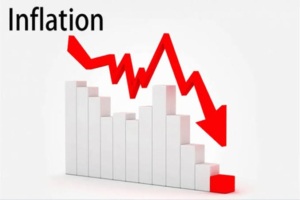Nigeria’s Inflation Rate Drops to 22.97% in May – NBS

The National Bureau of Statistics (NBS) has announced that Nigeria’s inflation rate dropped to 22.97% in May 2025, marking a 0.74 percentage point decrease from the 23.71% recorded in April.
According to the NBS Consumer Price Index (CPI) report released on Monday, the year-on-year headline inflation also fell significantly by 10.98 percentage points, compared to the 33.95% recorded in May 2024.
“In May 2025, the headline inflation rate eased to 22.97% relative to the April 2025 rate of 23.71%,” the report stated. “The decline was primarily driven by a slower increase in the average prices of goods and services.”
On a month-on-month basis, headline inflation stood at 1.53% in May, down from 1.86% in April, indicating that while prices continued to rise, the pace of increase slowed compared to the previous month.
Food inflation, a key driver of overall inflation, dropped sharply to 21.14% year-on-year in May, from 40.66% recorded in the same period last year. The NBS attributed the substantial annual drop to a change in the base year, following the CPI rebasing exercise. However, on a monthly basis, food inflation inched up to 2.19% in May from 2.06% in April, with increases noted in the prices of yam, cassava, maize flour, sweet potatoes, fresh pepper, and ogbono.
Urban inflation also showed a notable decline, falling to 23.14% in May from 36.34% in May 2024 on a year-on-year basis. On a monthly basis, it rose slightly to 1.40% in May from 1.18% in April.
Rural inflation followed a similar trend, dropping to 22.70% year-on-year from 31.82% in May 2024. Monthly rural inflation also declined, standing at 1.83% in May, down from 3.56% in April.
Core inflation, which excludes volatile agricultural produce and energy costs, decreased to 22.28% in May 2025 from 27.04% in the same period last year. On a monthly basis, core inflation dropped to 1.10% from 1.34% in April.
An analysis of divisional contributions to headline inflation revealed that food and non-alcoholic beverages accounted for the largest share at 9.20 percentage points. This was followed by restaurants and accommodation services (2.97%), transport (2.45%), housing, water, electricity, gas and other fuels (1.93%), and education (1.42%).
At the state level, Bayelsa recorded the highest month-on-month rise in headline inflation at 9.11%, followed by Bauchi (4.85%) and Borno (4.42%). In contrast, Kaduna (-6.75%), Jigawa (-4.40%) and Edo (-2.94%) saw the steepest declines.
For food inflation, Borno posted the highest year-on-year increase at 64.36%, trailed by Bayelsa (39.85%) and Taraba (38.58%). The slowest year-on-year increases were observed in Katsina (6.90%), Rivers (9.18%) and Kwara (11.31%).
On a monthly basis, Bayelsa (12.68%), Cross River (11.15%) and Anambra (9.10%) recorded the highest food inflation rates, while Katsina (-5.42%), Jigawa (-4.02%) and Kaduna (-3.27%) experienced declines.
Despite the relief offered by the rebased CPI figures, the NBS noted that the continued rise in monthly food and essential commodity prices remains a concern, as it sustains pressure on the cost of living across the country.
